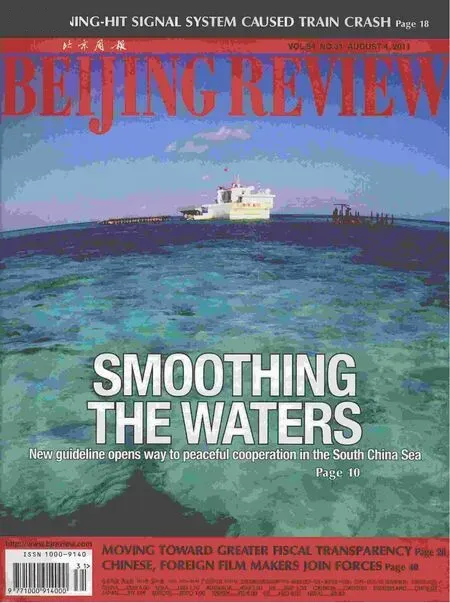The Overriding Interest
By ZHOU JIANXIONG
The Overriding Interest
By ZHOU JIANXIONG
Twenty years ago, far-sighted leaders of China and the Association of Southeast Asian Nations (ASEAN) launched a dialogue that deepened mutual understanding and trust, and helped forge close cooperation between the two sides. Since then, China and ASEAN have bolstered partnerships in many areas, to the bene fi t of all involved in the region. This also serves as an exemplary model of regional cooperation and development between countries with different social systems.
Despite the healthy and cooperative momentum, discord has now been sown between China and some ASEAN member countries over the sovereignty of all or part of the Nansha Islands in the South China Sea. This dispute casts a shadow for China and those countries, and may also hinder the overall development of China-ASEAN relations.
The territorial dispute was not overly controversial before the 1970s.On the contrary, Viet Nam, now a major disputant, had made it explicitly clear, on of fi cial occasions and in government papers, the Nansha Islands are part of Chinese territory. When large reserves of natural gas, oil and other resources were discovered in the late 1960s, territorial assertions were subsequently made, along with some islands being forcibly and unjusti fi ably occupied.
Chinese experts have cited ample historical records to show China discovered and has administered the Nansha Islands since ancient times,the fi rst nation to do so in the world, and its sovereignty has long been recognized by the global community. The Cairo Declaration, signed in 1943 before the end of World War II, among others, demanded Japan return all Chinese territories it had previously usurped, including the Nansha Islands.Regrettably, these proofs and documents are invariably ignored. Instead,reasons and arguments, many poorly founded or untenable, are advanced by some countries to back up their territorial claims.
Needless to say, China is willing to talk with all countries concerned to solve the dispute, for the sake of safeguarding its territorial sovereignty, and maintaining peace and stability in the region. But given the issue’s nature and complexity, a solution is not likely in the short term.In such circumstances, the most effective approach seems to be putting aside the dispute while collaborating in exploring and exploiting the region’s resources. In this connection, the just-concluded Bali ASEAN foreign ministers meeting from July 16-23 made a positive step in the right direction by adopting a guideline. Outside of this approach, any other actions: organized protests, hoisting national fl ags on disputed territory, or mere shows of force, will get nowhere but lead to confrontation and con fl ict. Meanwhile, China and the countries concerned should try to resolve the dispute by themselves and allow no outside interference and international policing, which will only make the situation more complicated and unsolvable.
In today’s world, where peace and development prevail, China and the ASEAN countries ought to comply with the irreversible trend of seeking closer economic cooperation and strategic partnership, as this is of overriding interest to the prosperity and development of the region.

